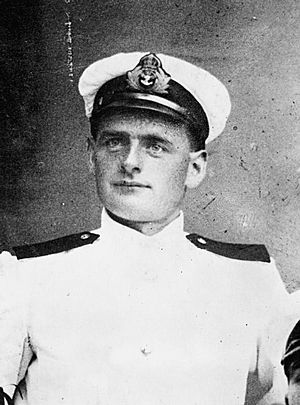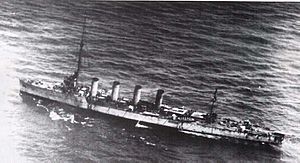Joseph Watt facts for kids
Quick facts for kids
Joseph Watt
|
|
|---|---|
 |
|
| Born | 25 June 1887 Gardenstown, Banffshire |
| Died | 13 February 1955 (aged 67) Fraserburgh, Aberdeenshire |
| Buried |
Kirktown Cemetery, Fraserburgh
|
| Allegiance | |
| Service/ |
|
| Years of service | 1914–1918 1940–1945 |
| Rank | Chief Skipper |
| Commands held | HM Drifter Gowanlea |
| Battles/wars | World War I *Serbian Campaign *Otranto Raid World War II |
| Awards | Victoria Cross Croix de Guerre (France) Italian Silver Medal for Military Valour |
Joseph Watt (born 25 June 1887, died 13 February 1955) was a brave Scottish fisherman who became a hero during World War I. He received the Victoria Cross, which is the highest award for bravery in the United Kingdom and Commonwealth of Nations. He earned this medal for his amazing courage during a battle in the Strait of Otranto. He also received awards from France and Italy for his service.
Contents
Early Life and Fishing Career
Joseph Watt was born in 1887 in a small fishing village called Gardenstown in Scotland. His family was large, and both his father and mother worked in the fishing industry. When Joseph was ten, his father was sadly lost at sea. After this, his family moved to Fraserburgh, where his mother later remarried.
Joseph learned to fish from a very young age. He worked on a boat called the White Daisy. Later, he bought a share in a fishing boat known as a drifter, named the Annie.
When World War I began, many men from fishing villages joined the Royal Navy. They often served on drifters and trawlers, which were similar to their own fishing boats. Their job was to patrol the seas, looking for enemy ships and submarines.
Joseph Watt was one of these men. He became a skipper in the patrol service. Before he went overseas, he married Jesse Ann Noble. In 1915, he was sent to Italy. He worked on drifters in the Adriatic Sea. His patrols were often boring, as he helped stop Austrian submarines from entering the Mediterranean Sea.
During this time, he was highly praised for his actions. He helped evacuate the Serbian Army after they were defeated in January 1916. For this, he received the Serbian Gold Medal for Good Service.
The Otranto Barrage Attack
In late 1916, Joseph Watt's drifter, HM Drifter Gowanlea, was attacked by an Austrian destroyer. The Austrians were trying to break through the line of drifters that blocked their submarines. Even though the Gowanlea was hit, it wasn't badly damaged, and the crew was safe. This attack was a sign of a much bigger raid to come. The line of drifters was now called the Otranto Barrage.
Victoria Cross Action
On 15 May 1917, Skipper Watt and his crew of eight men were patrolling the Otranto Strait. They were looking for any unusual activity because more submarines had been seen. They didn't know that the Austrians had planned a large attack on the barrage.
The Austrian force included three fast cruisers: SMS Saida, Helgoland, and SMS Novara. These ships were led by Admiral Miklós Horthy. They also had two destroyers and three submarines. During the night, these powerful ships attacked the drifter line. They sank 14 helpless trawlers and drifters, along with two destroyers.
The Gowanlea was confronted by the Helgoland. The Austrian ship demanded that Watt surrender and told his crew to abandon their boat before it was sunk. But instead of surrendering, Watt ordered his crew to fire their small 6-pounder guns at the much larger enemy ship.
The Gowanlea was quickly hit by four heavy shells. The boat was badly damaged, and several crewmen were wounded. Other drifters around the Gowanlea also fought back, but they too were hit hard. Three of them sank, and another was severely damaged. The Austrian cruisers then headed home. On their way back, they fought an undecided battle with British, Italian, and French ships.
For Watt and the survivors, the fight was now against the sea. Even though the Gowanlea was damaged and had casualties, Watt moved his boat through the wreckage. He rescued wounded men and gave medical help to those who needed it most. He especially saved the wounded crew of the sinking drifter Floandi, who would have drowned otherwise.
The Victoria Cross Award
Joseph Watt was the only drifter crew member to receive the Victoria Cross for this battle. Other brave men received the Conspicuous Gallantry Medal or the Distinguished Service Medal. Three of these were from the Gowanlea's crew.
Watt was not comfortable with the fame his award brought him. When asked for an interview after the war, he said that too much had already been said. He felt ashamed to read what he called "exaggerations" in the newspapers.
Soon after the battle, he became sick and spent the rest of the year in a hospital in Malta. He was then sent home to receive his award at Buckingham Palace. After that, he served on lighter duties as a Chief Skipper.
Life After the Wars
After World War I, Joe Watt returned to Fraserburgh. He refused to talk about his war experiences, even with his wife. His boat, the Annie, had been lost to a sea mine during the war. So, he bought a new boat called the Benachie.
He worked on several fishing vessels for the next twenty years. Then, he rejoined the Navy as a drifter captain for Second World War. He spent this war on quiet duties in home waters. His son, who had been wounded in the Battle of France and left the army, was with him. Joseph sometimes complained that he was not allowed to serve overseas because of his age. He thought his experience should have been an advantage.
Joseph Watt died of cancer at his home in 1955. He was buried next to his wife in Kirktown Cemetery in Fraserburgh. A local politician who visited him said that Joseph "had wonderful faith and courage."
His Medal
Joseph Watt never liked the fame from his award. He kept his Victoria Cross medal in a drawer full of old things on his boat. Many local people who asked to see the medal were surprised to find it kept in such a simple place.
His Victoria Cross medal was put up for auction in April 2012. Today, you can see it at the Imperial War Museum in London.
 | Aurelia Browder |
 | Nannie Helen Burroughs |
 | Michelle Alexander |


